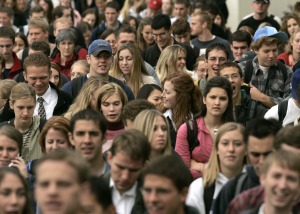

Facial Recognition Technology and an Individual’s Right to Privacy
Imagine being able to merely glance in the direction of a stranger and then instantly access everything about them that is available online including their address, age, date of birth, political affiliation, comments made about them on-line (truthful or not) criminal records, relationship status, and other information? Advances in facial recognition technology have allowed this to be a current reality. Individuals can instantly be identified and profiled by “wearable devices.” While this has clear value in efforts tied to law enforcement, national security and in some instances business and social settings, it has the potential to alter fundamental rights to privacy.
While this has clear value in efforts tied to law enforcement, national security and in some instances business and social settings, it has the potential to alter fundamental rights to privacy.
Should individuals have the right to remain an “anonymous face in crowd,” or should we have the right to use facial recognition technology to instantly identify and profile strangers who have not given their consent? A myriad number of potential situations arise that could have negative consequences for individuals.
In one example, businesses are exploring the potential value of being able to identify and profile shoppers that walk in their store. Those that have significant purchasing histories are met by employees who have awareness of their purchasing histories, and potentially a great deal of personal information. Other patrons may be recognized as having a criminal record and may be asked to leave or shadowed by a security guard. While this process may or may not be disconcerting to the average citizen, the potential for the use of this technology for more nefarious purposes also needs to be taken into consideration. An example of criminal use would be giving burglars the capacity to identify individuals who are in locations far from their home and then targeting their unguarded homes for home invasions.
The number of possible uses of this technology is difficult to predict. However, in health care individuals have a right to protect their health information, including what types of care they have been provided. Facial recognition technology has the potential to impact an individual’s HIPAA protected rights by matching them to locations where they are being seen, including potentially sensitive settings such as the waiting rooms of mental health facilities, AIDS clinics, and family planning centers. The patient would be identified, photographed, and profiled all without their knowledge or consent. The person who is collecting this information could elect to publish it to a public domain and the patient would have no legal recourse.
There has been a tendency for people to expose sensitive information about themselves in public or semi-public social media forums. This includes medical conditions, drug and alcohol use, conflicts with coworkers, opinions about their employer, DUIs, financial status, gambling behavior, scores on tests and a myriad of other pieces on information that they would be loath to share with an employer or acquaintances, and in some cases even with friends or family. Making matters worse, the Internet is replete with inaccurate or misleading information about individuals that can have devastating personal and professional consequences. Instant access to this information by complete strangers has obvious implications.
Advances in technology are an unstoppable force and in the majority of circumstances offer value to society. However, personal information that was once under the control of the individual is now readily available to complete strangers. This represents a paradigm shift in society that will demand close inspection and likely modifications as to how we approach our individual rights to privacy from cultural and legal perspectives.







Leave a Reply